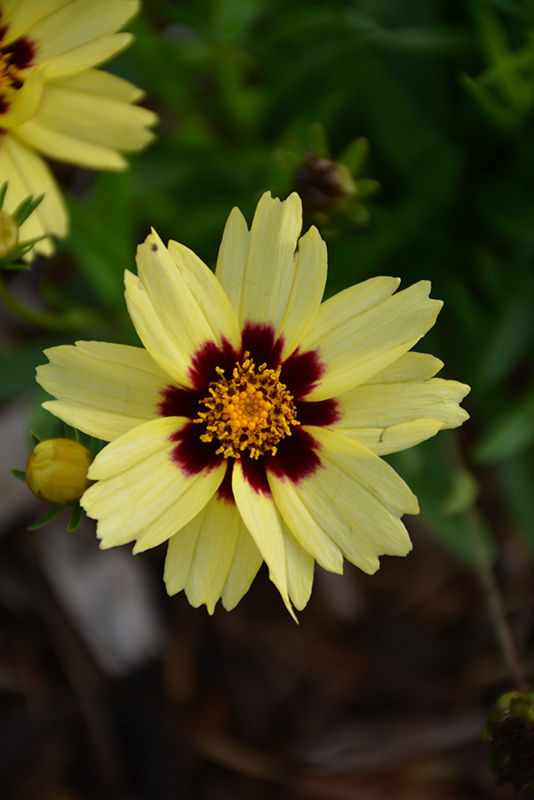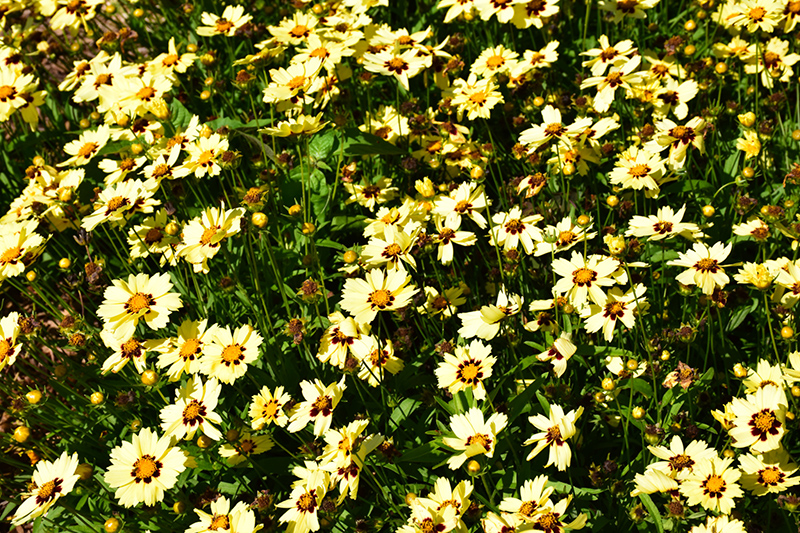UpTick™ Cream and Red Tickseed
Coreopsis 'Balupteamed'
Height: 14 inches
Spread: 14 inches
Sunlight:
![]()
Hardiness Zone: 4b
Group/Class: UpTick Series
Brand: Ball
Description:
A tidy, mounded variety, covered with striking, daisy-like yellow flowers with gold eyes and contrasting deep red-purple rings; tolerant of pests and drier soils; thriving in sandy and rocky soils; great as edging, or in containers; needs good drainage
Ornamental Features
UpTick™ Cream and Red Tickseed is smothered in stunning yellow daisy flowers with gold eyes and a burgundy ring at the ends of the stems from late spring to early fall. The flowers are excellent for cutting. Its narrow leaves remain emerald green in color throughout the season.
Landscape Attributes
UpTick™ Cream and Red Tickseed is an open herbaceous perennial with a mounded form. It brings an extremely fine and delicate texture to the garden composition and should be used to full effect.
This is a relatively low maintenance plant, and is best cleaned up in early spring before it resumes active growth for the season. It is a good choice for attracting bees and butterflies to your yard, but is not particularly attractive to deer who tend to leave it alone in favor of tastier treats. It has no significant negative characteristics.
UpTick™ Cream and Red Tickseed is recommended for the following landscape applications;
- Mass Planting
- Border Edging
- General Garden Use
- Container Planting
Planting & Growing
UpTick™ Cream and Red Tickseed will grow to be about 12 inches tall at maturity, with a spread of 14 inches. Its foliage tends to remain dense right to the ground, not requiring facer plants in front. It grows at a medium rate, and under ideal conditions can be expected to live for approximately 10 years. As an herbaceous perennial, this plant will usually die back to the crown each winter, and will regrow from the base each spring. Be careful not to disturb the crown in late winter when it may not be readily seen!
This plant should only be grown in full sunlight. It does best in average to evenly moist conditions, but will not tolerate standing water. It may require supplemental watering during periods of drought or extended heat. It is not particular as to soil pH, but grows best in poor soils. It is somewhat tolerant of urban pollution. This particular variety is an interspecific hybrid. It can be propagated by division; however, as a cultivated variety, be aware that it may be subject to certain restrictions or prohibitions on propagation.
UpTick™ Cream and Red Tickseed is a fine choice for the garden, but it is also a good selection for planting in outdoor pots and containers. It is often used as a 'filler' in the 'spiller-thriller-filler' container combination, providing a mass of flowers against which the thriller plants stand out. Note that when growing plants in outdoor containers and baskets, they may require more frequent waterings than they would in the yard or garden.
Disclaimer - This Plant Finder tool is an online resource representing many of the varieties that we carry over the course of the season, and is intended for informational purposes only. Inventory varies seasonally, so we cannot guarantee that every plant will be in stock at all times - please contact the store directly for current availability. It does not include our entire selection of plants, so be sure to visit our store to see varieties that may not be represented on this list.


